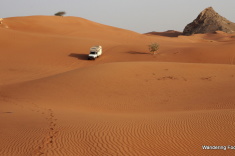Nope, not the “Good-Vibrations” harmonizing SoCal rock band Beach Boys. The beach boys of Kenya. And these kind of beach boys don’t give out good vibrations at all.
Picture it: You’re walking down an idyllic stretch of beach, hand-in-hand with your special someone. You stop to look at a bit of sea life among the rocky pools. You close your eyes and listen to the waves, feel the wind lightly caress your skin. And then you hear…
“Jambo!”
“So what?”, you, dear reader, might be thinking. Jambo is a nice word, a friendly greeting, with a pleasant ring to it.
But not on the coast of Kenya.
On the coast of Kenya, a “Jambo!” can pretty much mean only one thing. You’ve just encountered a Kenyan Beach Boy. And the “Jambo!” is only the hook. Now, the Beach Boy is going to try to reel you in.
.jpg) |
| back in July, with Lucille – We can’t escape the clutch of the Maasai-Beach Boy! |
“Where do you come from?”
“[Insert your country here].”
“How long are you in Kenya?”
“[Insert length of stay here].”
“Do you want to go snorkeling? Or, how about I take you to out to the reefs? Do you want to visit X? Or buy some seashells? Or some drugs?”
“No thanks. We’re just walking.”
“Maybe you buy one coconut at least?”
“No thanks. We just want to relax. Listen to the waves.”
“Well, at least look at my photo album of all the activities I can offer you.”
“NO! Thank you.” You’ve lost your cool a bit, now. You’re not proud, but this isn’t the first local guy who has approached you that morning with his sales pitch. This isn’t the first local who has disturbed your romantic, relaxing walk.
Far from it.
Beach Boys are young local men trying to make a living through tourism. Most of them survive by badgering tourists into various excursions. A lot of them sell drugs. And a few of them look for Western women (and sometimes men) to have sex with, getting a few beers and making a few bucks along the way.
.jpg) |
| our camper van parked at Tiwi Beach, with Beach Boys (one, a Maasai) walking along the beach |
What all Beach Boys have in common is that they are sticky like flies. You swat them away, gently at first, but they come back, buzzing in your ears and tickling your skin until you’re so exasperated that you swat them now with gusto.
They have another thing in common with flies. They’re numerous here on the Kenyan coast. Much, much too numerous.
Just for the record, I’m not a new traveler experiencing the ills of mass tourism for the first time. It’s not like I’ve never been to a tourist market or heard the touts and pleas of the local people desperately urging me to look at their wares, to come into their shop. But in Asia and South America, a polite “No thanks” and a friendly smile is enough and the vendor yields.
With Kenya’s Beach Boys, you have to renounce what they are offering so many times you feel as though you are speaking with a looping broken record. Even then, it’s often not enough, and the Beach Boys continue to toy with you – as though it’s a game – until you’ve become that angry and rude tourist you don’t want to be. I remember, in July, when I was new to Kenya, I couldn’t fathom being rude to “friendly” approaching locals, and more than once I got caught in interminable conversations with the Beach Boys. Bruno’s niece and I must have been one of their favorite targets because we were too polite to tell them to leave us alone.
.jpg) |
| Tiwi Beach with Lulu in July Note the approaching Beach Boy… |
Kenya’s Beach Boy situation is so excruciating that you end up questioning whether you really want to walk along the beach – the swimming pool or the campsite seem far more appealing. If you do decide to walk the beach, you find yourself constantly skimming the shoreline for what I now call “the sharks”, and turning in the other direction or walking out into the water to avoid them. Worse, you begin assuming that every young man is a shark, and you stop saying “Jambo” to the local fishermen, or making eye contact with the locals you pass.
I hate being that person. And I resent being put in that situation. Unfortunately, if you want to go to the coast – and especially along the North and South coasts of Mombasa – you will have to deal with Beach Boys. It’s an inevitable hazard of coastal Kenyan travel.
To be fair, I have met a few genuinely polite and helpful Beach Boys. One, in particular, called Rudy. An older, scruffy-looking rasta with a scrawny body and a worn face, he talked to me one afternoon about the plight and misperception of Beach Boys.
“Beach Boys give us Beach Operators a bad name,” he starts.
When I enquire as to what, exactly, is a Beach Operator, Rudy launches into what – for him – is a very important distinction.
“A Beach Operator is working the beaches to support his family. To survive. He’s here because he has to be, because there are no other jobs. A Beach Boy, on the other hand, is looking for sex. To profit from, and party with, as many foreigners as possible. Woman or man, it makes little difference to the Beach Boy.”
Rudy used to work at a big hotel at Diani Beach, some 15km away from his hometown of Tiwi Beach. After 2 years, on the cusp of gaining permanent employment, he was laid off. Without a degree or skill set, he was forced to become a Beach Boy.
But it wasn’t an easy process, as one might expect. He didn’t just show up on the beach one morning and begin selling his services. His past conduct had to be evaluated by the village chairman, then he was required to apply with the chief office and chairman of the beach cooperative, the equivalent of the Beach Boys’ Union. He had to write letters, sign papers promising good conduct, and come up with the 2100KSH fee (about $25USD).
“The Beach Boys giving us Operators a bad rap don’t go through this process,” he replies when I ask him if all the guys working on the beach have licenses. “They are accountable to no one, and that’s why they act so horribly. There’s nothing we can do about them.”
Between the licensed Beach Operators and the unlicensed Beach Boys, there are a lot of guys working the beach. There don’t seem to be a lot of tourists. The economics don’t quite make sense. I inquire into business.
“Things were good for a couple of years,” utters Rudy with a melancholic look in his eye. “There was food on the table and clean clothes on our backs.” Due to Kenya’s flagging international image, tourism has declined significantly in recent years and now surviving is becoming tougher and tougher.
“Tourism isn’t just low. It’s dead. Gone,” declares Rudy cheerlessly. As the eldest son, Rudy is expected to support his ageing father and younger siblings.
“How? What can I do?,” he asks, more to himself than to me.
I begin to understand why each tourist that walks onto the beach is like prey for a starving lion. We literally represent a meal to them. My analogy of Beach Boy as Shark is appropriate.
Rudy – no longer nameless or impersonal – has ceased to be part of the mass of Beach Boys that I see as a problem in Kenya. Over the next few days, I buy a few coconuts from him. I pay him half a dollar for each coconut, and he seems pleased. With that, I hope he is able to buy some flour for his family. I hope I judged him right, and that he’s not the “other” kind of Beach Boy – the one who will spend his money on beer or drugs rather than food for his family. It’s hard to tell. They all look alike, dressed in their ragged, torn clothing, sporting dreadlocks and dead looks in their eyes.
 |
| Rudy the Beach Boy bringing us our daily dose of coconut |
 |
| yummy young coconut! |
We left Tiwi, and Rudy, a couple days ago. Before leaving, we shook hands and wished one another well.
“See you next time,” I said.
“Next time you come to Tiwi, I hope I won’t be working the beach. If you see me, I hope it will be at my own local restaurant in the village. If Jah provides…”
As I write this blog, the waves from the Indian Ocean gently lap the shore not five meters away. I am still along the coast, but in Tanzania. The Beach Boys of Kenya are only a memory. It’s funny how a border can sometimes make all the difference. I am a mere 150km south, and yet this beach feels so, so different. There’s not a Beach Boy in sight here. All the young men here are fishermen, and they couldn’t care less about the few tourists that bob in the water or walk the beach.
“Jambo!”
I hear the strong, low-pitched greeting as Bruno and I are looking out at the wooden trimarans on the water.
I turn, and look, momentarily suspicious.
“Jambo,” I venture hesitantly.
And the young man, with a friendly smile and a quick wave, continues walking, toward his boat, his family, his village.—-
To view other posts about Kenya, click here! Topics include mangroves, Nairobi, off-roading, the Kenyan coast, safaris, books about Kenya, the Rift Valley, and the Marafa Depression.


